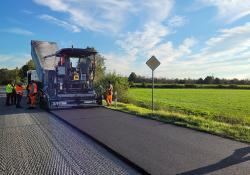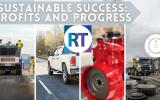The group is led by the World Business Council for Sustainable Development’s (WBCSD) Transforming Urban Mobility Project and the International Road Federation (IRF), under the framework of the Sustainable Mobility For All initiative (SuM4All).
The report “Sustainable Mobility: Policy Making for Data Sharing” now being launched has benefited from the input of industry members from WBCSD, from IRF and from several members of SuM4All. The report has been peer-reviewed by key experts from the sector and beyond.
The next generation of urban mobility and transportation is likely to take the form of progressively more evolved intelligent transportation systems. Increasing digitalisation of mobility presents us with an opportunity to accelerate the transition toward sustainable urban mobility. Many disruptive mobility businesses are built on the backbone of advanced data collection, processing, and use capabilities. Similarly, governments are using data to understand and monitor transportation systems better, complementing - and in some cases replacing - traditional methods to regulate transportation systems, and plan infrastructure to meet future needs. Although raw data alone are not sufficient, sharing of data can help generate actionable insights, which are necessary to achieve these goals (Figure 1)and ultimately facilitate the decarbonisation of transport also by supporting solutions that incentive customer behaviour change.
Why policymaking matters
Well-orchestrated policies will be critical to shape future data-sharing ecosystems, realise shared value for the public and private sectors, and achieve the desired sustainability outcomes. Data-sharing policies should also aim to minimise risks around privacy and cybersecurity, minimise mobility biases rooted in race, gender, and age, prevent the creation of runaway data monopolies, and bridge the widening data divide.
The absence of policymaking on the other hand, can lead to siloed approaches and potentially create a digital divide where few organisations control access to data and have the resources to use that data toward value creation.
Use cases for mobility data sharing
The use cases for mobility data sharing or ways in which data can be used for a given mobility application are numerous for both developing and developed countries. However, policy intervention may be most effective in use cases with a high potential for sizeable public good and where multiple heterogenous stakeholders are involved, and where normal public sector operations and private sector commercial mechanisms are unlikely to achieve the desired objectives (see Figure 2).
The mobility data-sharing policy framework
The mobility data-sharing policy framework seeks to serve as a comprehensive guide to policymakers globally, providing a categorisation of the policies required to enable, facilitate, and catalyse data-sharing in the mobility sector amongst public and private stakeholders.
The policy framework (Figure 3) consists of five interdependent and complementary layers and nine elements for policy intervention that address the entire life cycle of a data-sharing initiative. Each layer defines an area of policy intervention corresponding to data flow in a data-sharing collaborative. Additionally, embedded within each layer are specific policy elements that discuss the role of policymaking for each corresponding layer.
The framework offers 33 policy suggestions that can be tailored and adapted by policymakers to suit their own local mobility system, urban environment, and priority use-cases. Each of these policy suggestions builds on good practices from existing policies and data-sharing initiatives. Ten global case studies are annexed to the report and illustrate how the policy framework can be applied practically.
- Going forward, the group of experts will be working on a series of demonstration projects in different geographies and relating to different use-cases. For more information or to get involved, please contact Aman Chitkara [email protected]
- The report “Sustainable Mobility: Policy Making for Data Sharing” is accessible on www.sum4all.org







